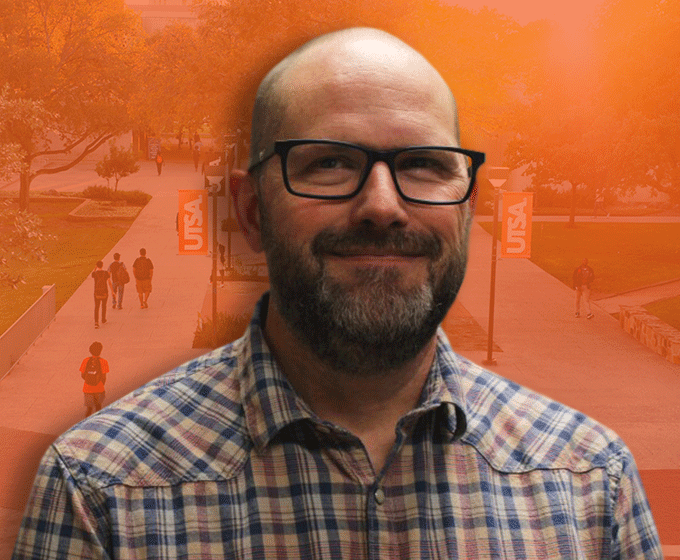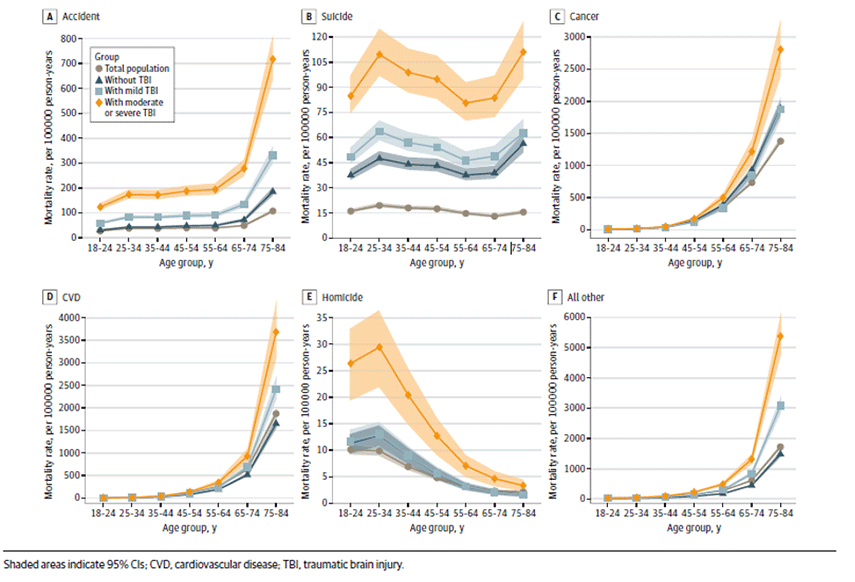
FEBRUARY 11, 2021 — Emerging evidence from a study led by Jeffrey Howard, associate professor of public health in the UTSA College for Health, Community and Policy (HCaP), suggests that harmful exposures during military service such as traumatic brain injury (TBI) may contribute to long-term mental health, chronic disease and mortality risks.
This is the first study of its kind to estimate the number of excess deaths among a large cohort of post-9/11 military veterans compared to the general U.S. population of the same age, sex and racial/ethnic composition. Excess deaths are defined as deaths that exceed the typical number of expected deaths during a particular period for a given population.
“There are real-world implications for veterans with traumatic brain injury,” Howard said. “The findings of this study provide insight to help health care systems understand the potential burden of morbidity and mortality among this cohort.”
Howard noted that the findings provide heightened awareness of the causes of death, particularly suicide and homicide. “We need to understand where the risks are the greatest and devise better methods of intervening,” he said.
The study has been published in the Journal of the American Medical Association Network Open, a companion publication of the Journal of the American Medical Association.
While research from previous wars suggests that military veterans benefited from lower mortality rates than the total U.S. population, recent research suggests that this “healthy soldier effect” may be disappearing among post-9/11 veterans.
Howard and his team studied data on 2,516,189 post-9/11 military veterans and discovered that they experienced excess mortality rates compared with the total U.S. population. The numbers of excess deaths were greater among those exposed to TBI.
“After WWII, Korea and Vietnam, veterans of those wars tended to have lower age-specific mortality than the general population because younger, healthier people tend to be selected for military service,” Howard said. “However, we are not seeing this same pattern with veterans who have served after 9/11.”
In general, exposure to trauma is associated with increased risk of long-term chronic disease such as diabetes, kidney disease and more, as well as a greater risk for individuals to engage with opioids and greater alcohol use. Military veterans have an even higher risk for these factors.
The study’s findings suggest important patterns highlighting increased health risks for veterans. In addition to overall greater mortality risks for veterans compared to the general population, there were dramatically higher mortality risks for veterans exposed to TBI across all causes of death, especially for those with moderate-to-severe TBI.
As noted in the figure below, individuals with moderate or severe TBI had significantly higher mortality rates than veterans without TBI, veterans with mild TBI and the total population. While accidents and suicides contributed the most to the number of excess deaths among veterans with and without TBI, there were also significant numbers of excess deaths from cancer, cardiovascular disease and homicide among veterans with TBI exposure.

“These rates paint a pretty stark picture,” Howard said. “The cost of war is not measured just in terms of combat deaths. Military service can not only come with harmful mental exposures but environmental factors as well which follow service members for many years.”
“After 20 years of war, it is vital to focus attention on what puts veterans at risk for accelerated aging and increased mortality, as well as how it can be mitigated,” he added.
The College for Health, Community and Policy was founded to develop solutions for complex social issues, improving the well-being of society. This study is one of many underway at the college to shed light on complex health risks, with the goal of finding new ways to address the burden of care on community health care systems.
UTSA Today is produced by University Communications and Marketing, the official news source of The University of Texas at San Antonio. Send your feedback to news@utsa.edu. Keep up-to-date on UTSA news by visiting UTSA Today. Connect with UTSA online at Facebook, Twitter, Youtube and Instagram.
Enjoy snacks while connecting with Adobe reps and student ambassadors. Download or log into the Adobe Express app to snag swag and unlock exclusive back-to-school templates. It’s a fun, fast way to get creative and start the school year with bold moves.
Central Plaza, Main CampusCelebrate the merger of UTSA and UT Health San Antonio with a pop-up featuring free t-shirts, exclusive swag, and interactive photo opportunities. Open to all students, faculty and staff. Supplies are limited!
Sombrilla Plaza, Main CampusHuddle Against Hunger is a fundraising competition with Texas State that benefits our Roadrunner Pantry. Donations this week will help UTSA earn additional prize monies provided by RBFCU.
In-Person and VirtualJoin UTSA Libraries for an update on federal public access policies and how the library can assist with compliance.
Virtual EventWe invite you to join us for Birds Up! Downtown, an exciting welcome back event designed to connect students with the different departments at the Downtown Campus. Students will have the opportunity to learn about some of the departments on campus, gain access to different resources, and collect some giveaways!
Bill Miller PlazaThere are many citation managers. Which one is right for you? This workshop will explain what a citation manager is and how it can help you organize your citations, insert citations as you write your paper, and generate your bibliography.
Virtual EventPubMed is an essential database for anyone conducting biomedical or health-related research. This workshop will teach attendees how to effectively navigate this free resource and locate peer-reviewed articles using advanced search features, MeSH subject headings, and Boolean operators.
Virtual EventThe University of Texas at San Antonio is dedicated to the advancement of knowledge through research and discovery, teaching and learning, community engagement and public service. As an institution of access and excellence, UTSA embraces multicultural traditions and serves as a center for intellectual and creative resources as well as a catalyst for socioeconomic development and the commercialization of intellectual property - for Texas, the nation and the world.
To be a premier public research university, providing access to educational excellence and preparing citizen leaders for the global environment.
We encourage an environment of dialogue and discovery, where integrity, excellence, respect, collaboration and innovation are fostered.